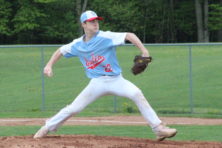Sevastopol Teams Repeat as Global Champions
- Share
- Tweet
- Pin
- Share

Two teams win titles at world Destination Imagination event
Sheriff’s cars and Egg Harbor fire trucks, sirens blaring, escorted a charter bus filled with Global Champions May 22 as they returned from Kansas City, Missouri, to Sevastopol school.
“Rootie, toot, toot; Rootie, toot, toot: We’re the team from Ins-ti-tute,” the students cheered as they were greeted outside the school in Institute by parents and supporters.
For the second year in a row, two Sevastopol teams won global titles. It was a repeat for both teams, said Annie Rabach, who leads the DI teams with Jerry Borkovetz. This was the 30th year for Borkovetz, a volunteer, coaching the teams.
“The kids just love him,” Rabach said.
An elementary-school team, The Magix, finished first overall for its performance, preparation, reporting and conclusions in a scientific, eight-minute Instant Challenge. The students walk in, judges tell them what to do and what problem to solve, and they go to it.
Mayra Silas-Cordua said she and her six teammates won the Far-Fetched Scientific Challenge, beating out the runners-up from Maryland by nine points and third-place Texas.
“We had to bring a story about a tall tale and we needed scientific research to prove this hyperbolic trait right or wrong,” she said. “We chose fortune telling, and we proved it wrong in many ways. I feel like the main way was taking a coin flip and predicting heads and tales. The fortune teller was false, or fake, because he only predicted about 50 percent of the coin flips.”

Her team also included Shane Leist, Silas Martin, Ryder and Will Ortmayer, Maggie Thomas, Jackson Toivonen and managers Mindi Vanderhoof and Shelley Stenzel.
The high school engineering team, the Ultimate Miners, finished first out of about 50 teams from all over the world – likely a tougher proposition than in 2022, when teams from many countries did not travel due to COVID-19 restrictions and protocols. The team also won a DaVinci Award for “teams that most clearly demonstrate that spirit of adventurous risk in their solutions – those who most creatively traveled to reach truly new and unique destinations.”
The engineering team conquered the Thrill Ride competition, planning and presenting a final product in a challenge to build the strongest and fastest roller-coaster model possible in a six-foot by six-foot space. The Sevastopol team had by far the fastest coaster, coming up with the idea to construct the model in a barrel and to have a golf ball travel the “track” at a high rate of speed when students spun the barrel, said team member Liam Schultz.
“They had to build a roller coaster that went the fastest,” Rabach said. “It was sort of a gravity solution that made it go really fast and really far. They were leaps and bounds above everybody else. They beat a team from China that came from an engineering school. Beijing, China has 21 million people living in their city.”
Rabach said the teams worked hard and earned everything they got. Team member Liam Schultz said that hard work included talking about their Thrill Ride competition for about six weeks and brainstorming multiple ideas that they then refined into the winning idea – “which was basically a barrel flipped on its side which had a weight attached to it and then rotated,” Schultz said. “This then allowed the golf ball to go through (the track inside the barrel) at very high speeds for a very long distances.”
Other global champ engineering team members included Danica Schultz, Ben Martin, Finn Mathews, Zoey Copiskey, Marcus Mann and Evan Isaksen. Their team managers were Nick Schultz and Jenny Hobart. The previous year, the engineering team won a global championship for building the lightest-weight structure that rolled down a ramp and held as much weight as possible.
“Last year there weren’t very many other countries, but this year there were multiple other countries and our biggest competition was probably China,” Schultz said.A new Sevastopol team of Grace Brandenburg, Ali Czagas, Madi Jarosh, Jaya Lama, Henry Mathews, Willa Raynier, Preston Surfus and managers Kim Lama and Susan Czagas that qualified for the global competition finished 16th out of about 50 teams in a fine arts challenge.



